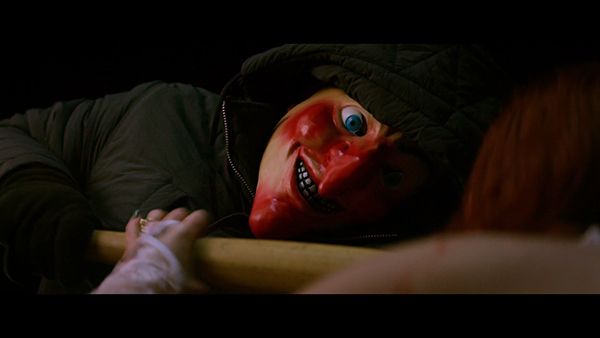Eye For Film >> Movies >> Punch (2023) Film Review
Punch
Reviewed by: Jennie Kermode

“We don’t really have a slasher franchise in the UK. We don’t have a Freddy or a Jason,” Andy Edwards told me last year when explaining his plans for this film. It was a statement which might have excited some fans and worried others. After all, the best films require a bit of originality, and whilst a UK-based slasher might be interesting, it wouldn’t bode well if it began life as an imitation. Both sets of fans (and many other viewers besides) will be pleased, however, by the work which premiered at 2023’s Frightfest. It’s a film which sets up a distinctive character and which also has character of its own.
The figure of Mr Punch has a history dating back some four hundred years, originating in Italy but evolving to take on a form which is unique to the English seaside tradition. It’s a form which has always existed at the intersection of comedy and horror. Punch is, after all, a domestic abuser and child killer, even if people cheer for him when he outwits the police. He’s a monster who sums up the worst of small minded male chauvinist culture but whose honesty, occasioned by drunkenness, points up social hypocrisies and invites us to laugh at the ridiculousness of it all. His excesses are made safe by the device of puppetry, which emphasises that we’re not seeing something real, and by the fact that most of us only see him when on holiday, which keeps him distant from our homes.

For some people, of course, those seaside towns are home. A minor character’s reference to Morrissey seems to be both a comment on who that character is and an allusion to a certain song about exactly this kind of off-season wasteland. It’s a town full of men who think that innuendo about sausages is the height of wit, and whose dating strategy involves shouting “Oi! I’m talking to you, darling!” at random women in the street. Bleary-eyed parents keep their kids in line with tales of the sinister Mr Punch, and teenagers dare each other to go out to the end of the pier at midnight, where he is supposed to lurk. They say that those who tried did not return. There are missing person posters all over the lamp-posts and shop windows, drifting like tumbleweed through lonely streets. Some of them picture Frankie (Alina Allison), but Frankie is alive.
She gave them all a good scare, going off to university without telling anyone, but she felt that it was the only way she could get out. It didn’t last long. When we meet her she’s been back for three weeks, looking after her deeply troubled mother, who makes no secret of her resentment over her plan to leave again. On her last day in town, Frankie catches up with her best friend, Holly (Faye Campbell), and her ex-boyfriend, who is known as the Dazzler (Macauley Cooper). There’s a party, drink and drugs and music and promises of a good time. What they don’t know is that, at the same time, a hooded figure wearing a Punch mask is stalking through the town wielding a big club, violently attacking young people whose behaviour he deems inappropriate. Inebriation, sexual impropriety and more are dealt with in traditional slasher movie fashion – but it’s Frankie who has committed the biggest sin of all, by demonstrating a lack of loyalty to the town, by thinking that she can do better.
The sheer scale of the body count here will thrill lovers of traditional slasher movies, and it makes more sense than in most other such tales because most of Punch’s victims are far too wasted on drugs or alcohol to put up a fight. Edwards also makes very effective use of the mental disconnect which many people experience when witnessing an unexpected act of violence, delaying any kind of practical response. We accept it because of their condition, though the truth – often ignored in cinema – is that it’s commonplace regardless. As Edwards deploys it, it also creates space for us to feel sympathy with the victims, even without having to know them, because this is evidently so alien to their happy-go-lucky world.
Also important to achieving this effect is humour. Although the overall atmosphere of the film is downbeat, Edwards appreciates that we need moments of relief, and the ribald, playful humour of revellers supplies it amply, also adding to that sense of what is real and what does not belong. Even where they lack Frankie’s impetus to strive for more fulfilling lives, the young people we meet are lively and spirited, looking for fun wherever they can find it. They present a stark contrast with the dour-faced, weary older women of the town, who barely raise their eyes, let alone their voices, as the older men throw their weight around. The underlying threat here – as much as that from the killer – is that if they survive this brutal night, their spirits will be broken, and that’s what they’ll become.
Edwards’ triumph lies in the way he weaves together the nightmarish figure of Punch with the spirit of a town where people tear down their phone mast for fear of being infected by 5G, and where they tear down one another as a matter of course. He’s aided by Edwin Matthews’ marvellous sound design. There are moments out on the beach or on the promenade by night, when the boom of the sea intermingles with the tinny music from the arcades and the muffled roar of traffic, when one can almost smell the salt air and the dropped chips and the vomit in pub doorways. The spirit of the English seaside is alive in all its wild, mendacious, ancient glory, the madness of Albion which invites nostalgia and sometimes love and always terror, for those who have seen beyond the mask.
Punch is available on UK digital platforms on 22 January 2024.
Reviewed on: 24 Aug 2023
















